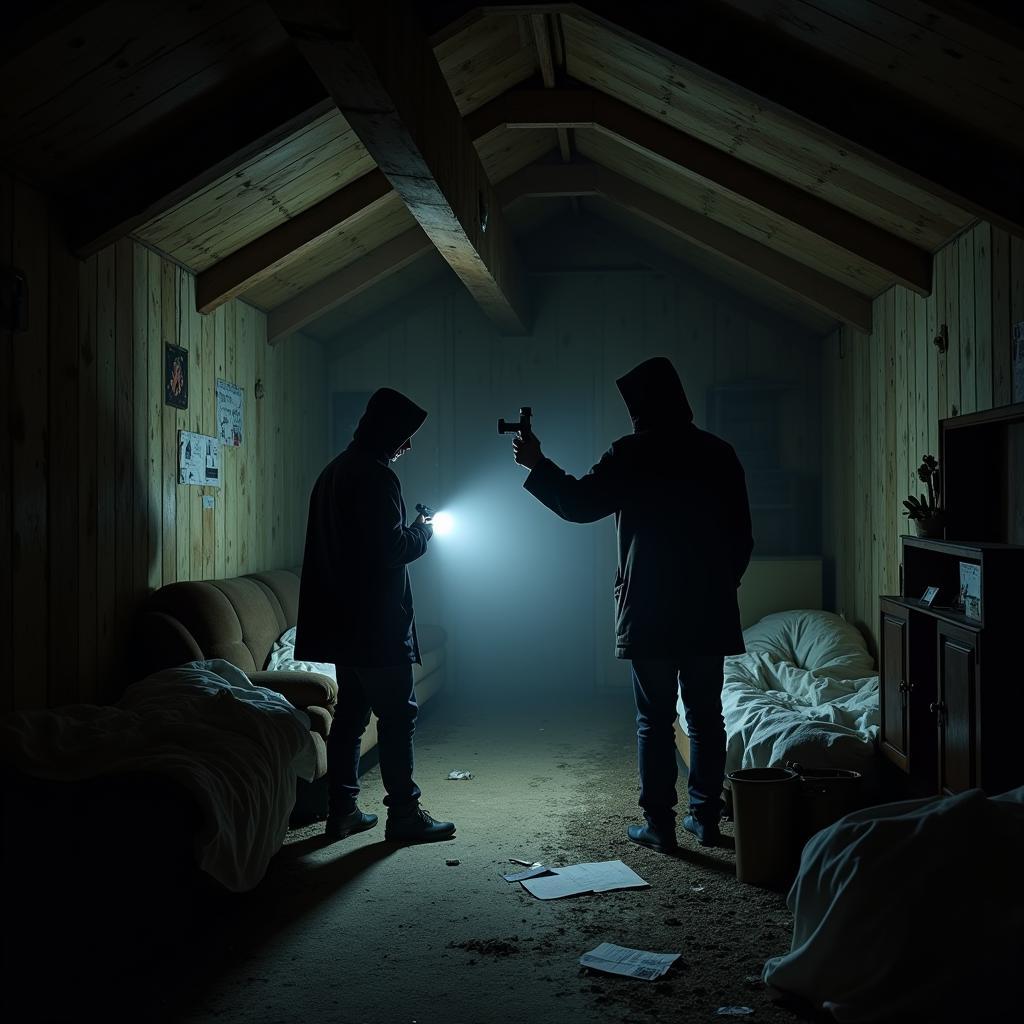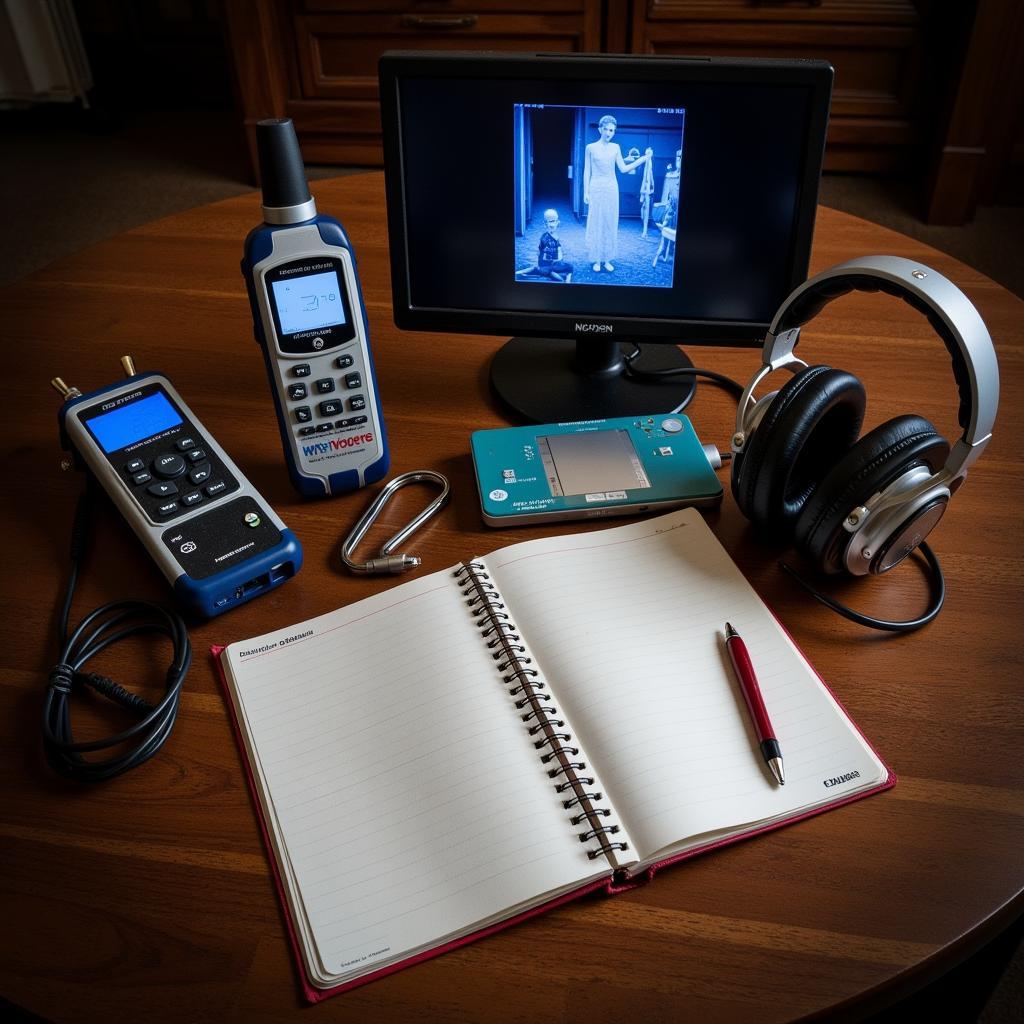Paranormal Researchers are dedicated individuals who delve into the unexplained, seeking evidence of phenomena beyond conventional scientific understanding. These individuals, driven by curiosity and a thirst for knowledge, employ a variety of methods to investigate alleged hauntings, psychic abilities, and other unexplained occurrences. From historic mansions to eerie forests, paranormal researchers venture into the unknown, often equipped with specialized tools and a healthy dose of skepticism. What drives these individuals to explore the fringes of reality? What skills do they need to navigate the shadowy world of the paranormal? Let’s delve deeper into the fascinating world of paranormal researchers.
Who Are Paranormal Researchers and What Do They Do?
Paranormal researchers are essentially investigators of the unknown. Their work often involves visiting locations reported to have paranormal activity, conducting interviews with witnesses, and collecting data through various means. Some skills of researchers include critical thinking, meticulous documentation, and a strong understanding of scientific principles. This allows them to discern between genuine anomalies and explainable occurrences. Many researchers operate independently, while others work within organized groups or research societies.
A crucial aspect of paranormal research involves understanding what are research objectives. Are they seeking to prove the existence of ghosts? Are they trying to understand the nature of psychic phenomena? Clearly defined objectives are essential for any successful investigation.
 Paranormal Researchers Investigating a Haunted Location
Paranormal Researchers Investigating a Haunted Location
Essential Skills for Paranormal Researchers
What makes a successful paranormal researcher? It’s more than just a fascination with ghosts and ghouls. Effective paranormal researchers possess a unique blend of scientific curiosity and open-mindedness, coupled with a healthy dose of skepticism. They must be able to approach investigations with an objective lens, carefully analyzing evidence and avoiding biases. Learning how to avoid bias in qualitative research is paramount.
- Critical Thinking: The ability to analyze information objectively, identify logical fallacies, and consider alternative explanations is crucial.
- Technical Proficiency: Familiarity with various equipment, such as EMF meters, thermal cameras, and audio recorders, is essential for collecting data.
- Research Skills: Knowing how to conduct thorough background research on a location, including its history and any reported paranormal activity, is vital.
- Communication Skills: Effectively interviewing witnesses and conveying findings clearly and concisely are important aspects of the job.
“A good paranormal researcher doesn’t jump to conclusions,” says Dr. Emily Carter, a prominent researcher in the field. “They meticulously gather data, analyze it critically, and remain open to all possibilities, even if those possibilities point towards conventional explanations.”
 Equipment Used in Paranormal Investigations
Equipment Used in Paranormal Investigations
The Importance of Research Methodology
Just like any scientific endeavor, paranormal research requires a structured approach. A solid research proposal literature review is crucial for establishing a theoretical framework and understanding the existing body of knowledge. This includes reviewing previous investigations, relevant scientific literature, and historical accounts. Developing a clear research methodology ensures that data is collected systematically and analyzed objectively. This is crucial for maintaining credibility and avoiding the pitfalls of confirmation bias.
Protecting Researchers: Safety First
Working in potentially dangerous environments, from abandoned buildings to remote locations, necessitates prioritizing safety. Understanding how to protect the researchers under fire timer and having established safety protocols are essential. This might involve working in teams, carrying appropriate safety gear, and having a clear communication plan.
Conclusion
Paranormal researchers play a vital role in exploring the unexplained, pushing the boundaries of our understanding of the world around us. Their dedication to objective investigation, coupled with a healthy dose of skepticism, is key to uncovering the truth behind these mysterious phenomena. While the existence of the paranormal remains a topic of debate, the work of these dedicated individuals continues to intrigue and inspire. Are you fascinated by the unexplained? Perhaps you have what it takes to become a paranormal researcher.
FAQ
- What qualifications do I need to become a paranormal researcher? There are no formal qualifications required, but a strong interest in the paranormal, critical thinking skills, and a willingness to learn are essential.
- Is paranormal research dangerous? It can be, depending on the location and nature of the investigation. Safety should always be a top priority.
- What equipment is used in paranormal research? Common tools include EMF meters, thermal cameras, audio recorders, and various sensors.
- How can I get involved in paranormal research? Consider joining a local paranormal group or research society.
- Is Paranormal Research scientifically accepted? The scientific community generally considers paranormal phenomena to be outside the realm of established scientific principles.
Need further assistance in your paranormal endeavors? Contact us 24/7: Phone: 0904826292, Email: research@gmail.com or visit us at No. 31, Alley 142/7, P. Phú Viên, Bồ Đề, Long Biên, Hà Nội, Việt Nam.